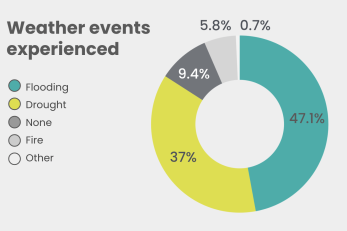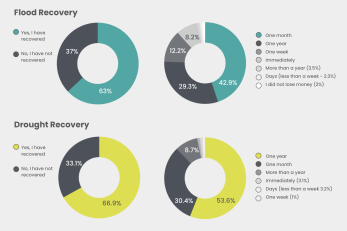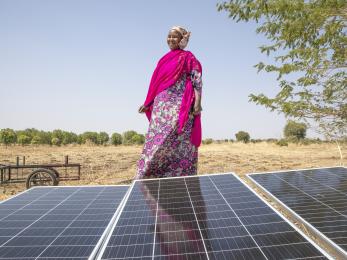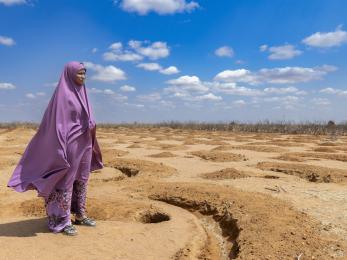How startups can help small businesses build climate change resilience
Mercy Corps Ventures shares research on how businesses can cope with climate shocks

Small businesses constitute 90% of businesses globally. Across Africa, Asia, and Latin America—and particularly in rural and underserved communities within these regions—small businesses are a critical link to basic goods and services, and a major driver of employment, providing over 50% of jobs and generating income for millions of households around the world.
However, despite their essential role, these businesses are underserved in several crucial areas that could hinder their growth and resilience. These areas include the supply chains they use, their access to markets and information, and their access to financial services.

To that end, we are interested in understanding and investing in solutions to what we see as one of the most important disruptors to these communities: climate change.
We wanted to know:
- What impact is climate change having on small business owners in underserved communities in emerging markets?
- How can small businesses build resilience to the impacts of climate change, and how can startups enable this?
In our latest research with Circle Innovation, we interviewed nearly 450 small business owners across two markets in Africa: Nigeria and Kenya.
This research reveals the opportunity in providing the roughly 162 million small businesses in emerging markets with climate solutions, laying the groundwork for innovators, investors, and funders to positively impact these enterprises with products and services that can build their climate resilience. The article below explores several of our key findings and insights.
For small businesses, climate change is here and happening now
Ninety percent of small business owners we interviewed had heard of “climate change,” primarily through local radio or television. “There is no one who is not affected by climate change,” said Adela, a female shop owner selling consumer goods in an urban area of Nigeria who participated in our interviews. “I close my shop when it is raining and I lose sales because I do not open at the usual times. So if I know how to change [to adapt to these climate-related impacts], I won’t be affected as much.”
Our research showed us that Adela wasn’t alone in experiencing these challenges: 90% of the small business owners we interviewed reported that weather-related events had impacted their business. As illustrated in the chart below, their most commonly cited challenges were flooding and drought.
Survey Response: What extreme weather event did you recently face that impacted your business?

Floods and droughts caused the majority of damage to small businesses who participated in our survey, and their communities. While floods created direct and immediate damage to goods and infrastructure, droughts brought on a decrease of availability of goods since agricultural and farming production declined. Small businesses face much more difficulty in recovering from droughts as compared to flooding, because droughts are longer-term and more deeply impact their customers. Most reported that it took them a full year to recover from a drought, whereas 63% had recovered from flooding after just one month.
Recovery from flooding and drought

Drought and flooding provide us with two archetypes of climate shocks—floods are faster onset, with shocks to small businesses and communities that are quick to arrive and faster to recover from. Droughts take longer for the impacts to be felt, but they also take longer to diminish and are more difficult to recover from—their impacts are felt deeply in the production and availability of goods and in the overall income level of communities.
We also found that climate change exacerbates existing exclusion and barriers faced by small businesses. One common example is the lack of access to financial products. Without access to credit products, small businesses rely heavily on cash flow and small amounts of savings to operate. In times of shock or in an effort to grow, they often turn to predatory loan products and make use of intermediaries with high fees. We found that extreme weather events only compound these existing challenges, by putting more pressure on cash flow and savings, or necessitating the use of additional loans to rebuild.
The opportunity for resilience
This research demonstrates an opportunity and an imperative to better serve the changing needs of small businesses in the context of climate change. We see a number of specific products and services that can increase the resilience of small businesses, and believe that the startups already serving this group with digital platforms (such as stock ordering) can integrate and deliver these services. Here are three examples of those products that can help small businesses build resilience and how they can be implemented through digital platforms:
Weather information services
The small business owners we spoke to were often unable to prepare for weather shocks because forecasts were unreliable or completely unavailable. We see a clear opportunity for startups to include weather information in their offerings to small businesses. But instead of simply offering a weather forecast, they could also provide actionable insights on preparation steps, alongside financial products or supply delivery scheduling, to help businesses navigate upcoming weather events.
Credit and integrated savings to recover from weather events
There’s a high demand for loan products that fit the cash flows and needs of small businesses during shocks. But current digital credit products on the market are too expensive and inflexible. Credit products to enable preparation and recovery from shocks could take many forms, including:
- Short-term loans that are deployed quickly without physical verification of collateral or shop space.
- A rotating credit line for regular customers on a lender’s digital platform, which could be coupled with weather and stock information to help prepare for disaster events.
We found that 85% of small business owners had used their savings to recover from a weather event, most often to provide for basic necessities immediately following a shock. Digital platforms have an opportunity to integrate savings projects for small businesses, helping entrepreneurs to build more resilience.
Adaptation solutions
Some of the shop owners we interviewed expressed interest in solutions to adapt their shops in the longer run and safeguard their income in the case of disaster. These solutions take many forms including renovating infrastructure to guard against flooding, buying necessary equipment, and having enough capital to stock essential and diverse items during related supply chain disruptions. Many of these solutions will require creative financing products specifically designed for small businesses in this context, such as loans with affordable interest rates and longer repayment periods. We also see potential for innovative approaches that maximise the affordability of these products through cost-sharing, like services that can be jointly purchased and used by multiple retailers.
As climate change escalates, we have an opportunity to positively impact 162 million small businesses globally with tailored products and services. Over the past seven years, we’ve seen innovators in our portfolio drive rapid progress to serve small businesses and increase their income opportunities through digital platforms. We must leverage these platforms to design solutions to the urgent and changing needs of small businesses struggling to navigate climate impacts. We see the insights and recommendations from this research as the first step in a wider dialogue that Mercy Corps will be continuing with the ecosystem. Meanwhile, we’ll also be taking action ourselves, by exploring how our Mercy Corps Ventures portfolio companies can incorporate climate resilience into their offerings, and how they think about their customers’ needs and aspirations in the context of climate change.


